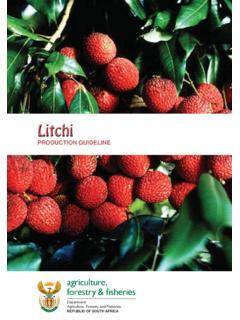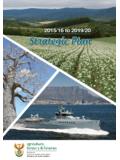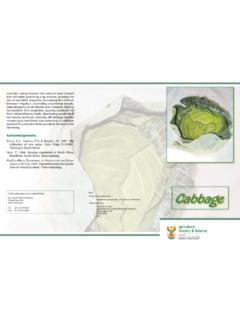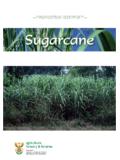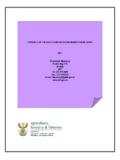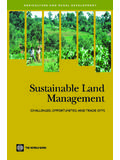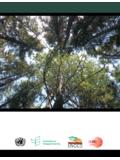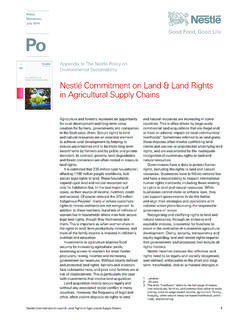Transcription of DAFF
1 DAFFO fficial newsletter of the Department of Agriculture, Forestry and FisheriesNovember 2016 Sustainable farming practices were a highlight in the discussions on natural resources management at the Seventh Biennial National LandCare Conference in Kimber-ley in October. The 4-day confer-ence, which took place from 3 to 6 October was held under the theme, Making a LandCare difference to-wards achieving land degradation neutrality. The theme of the con-ference reinforces the department s commitment to improve LandCare programmes in halting and revers-ing land degradation and the effects of climate change may have taken a toll on agricultural productivity and soil care, it is important not only for farmers but the community at large to contribute towards sustainable use of natural resources. Government, through the Department of Agricul-ture, Forestry and Fisheries, farmers and stakeholders gathered at the Mit-ta Seperepere Convention Centre to demonstrate Conservation Agriculture as one of the measures to address the impact of climate change on the eco-system s production, ecological and sociocultural services.
2 Conservation Agriculture is a concept that involves minimum soil disturbance, permanent Improved farming practices can prevent land degradation By Jamela Nkanyanesoil cover and crop integration and ro-tation. At the centre of the discussions were land degradation measures that could be taken to prevent it. The department is already at the forefront of confronting the drought scourge by drafting legislative frame-work such as the Conservation Agricul-ture Policy. Speaking on behalf of Min-ster Senzeni Zokwana, the Premier of the Northern Cape, Sylvia Lucas, said that the department is aware that when Conservation Agriculture is adopted, moisture conservation is achieved. This will encourage society to partici-to p3 MEC for Agriculture in the Northern Cape Mr Norman Shushu and his en-tourage visiting the exhibition stands during the LandCare 2016 DAFF news No. 11 2 DepartmentalEditor Piwe Mbiko (012) 319 6936 Lerato Mofokeng (012) 319 7927 Thuli Lehong (012) 319 7929 Samuel Kgatla (012) 319 7181 Innocent Mhlanga (012) 319 7827 Rony Moremi (012) 319 6622 Jamela Nkanyane (012) 319 6903 Mercia Smith (012) 319 6666 Jarius Mmutle (012) 319 7366 Kwanale Mhlanga (012) 319 6958 Lebogang Molopo (012) 319 7819 Sheila Flockton (012) 319 7141 is the newsletter of the Department of Agriculture, Forestry and Fisheries.
3 Private Bag X250, PRETORIA 0001. It is published by the Directorate Communication Services, Private Bag X144, PRETORIA 0001. Opinions expressed in DAFF news are not necessarily those of the editorial team. No part of this newsletter may be reproduced or trans-mitted in any form or by any means, including photocopying, recording or any information storage or retrieval system without prior permission from the a LandCare difference towards achieving land degradation neutralityLandCare delegates on a field visit learning about grazing land rotation at the Prieska Conservation Agriculture 11 DAFF news November 20163 DepartmentalDNpate in stopping actions that lead to land degradation and reversing land degradation by doing more rehabilita-tion of affected land . She further re-lated to the gathering that making this difference is the only means towards revitalising the agriculture sector, food security and improved economic growth and reducing farmers like Boitumelo Shole from the North West province have been following the conference for a while and he attests that conserva-tion Agriculture and new technologies can assist in natural resources man-agement to prevent land degradation .
4 During an interview with the SABC current affairs programme, Morning Live, Shole said, Because of climate change we need to adapt to new tech-nologies that will assist us to be more efficient as farmers to sustain our op-erations and also look after natural re-sources. We need to work with research in-stitutions to find solutions to continue farming in a sustainable manner. Shole further acknowledged that farm-ers have a mandate to produce food for urban people and for the growing population of the world and that it s their responsibility to look at new so-lutions. His farm already practices a concept that works towards no till or minimal soil till where they try not to disturb the soil from planting to har-vesting. This concept helps to con-serve moisture in the soil and prevent soil erosion. Amid the drought, South Africa is also challenged with the declining ag-ricultural land resources prompted by factors that affect the capital land size availability to feed the growing popula-tion.
5 To this effect, the department is in the process of public consultation on the policy and legislation on the Pres-ervation and Development of Agricul-tural land to protect constitutional op-eratives and national food sovereignty. The department is also enforcing the Conservation of Agricultural Resourc-es Act, 1983 (Act no. 43 of 1983) to ensure sustainable management of the natural resources through combat-ing soil erosion, eradication of weeds and bush encroachment and promot-ing veld management. Further speaking on behalf of Minis-ter Zokwana, Premier Lucas appealed to all delegates in the conference to make use of the opportunity to inform the process and provide valuable in-puts on the draft documents that are under public were also invited to join from p 1 Improved farming practices can prevent land degradation government s commitment and advo-cate for the embracing of community-based and community-led interven-tions to land degradation rather than service provider driven modalities.
6 This community driven approach and grass-root system will indeed help to realise the goal of optimising pro-ductivity and enhancing sustainable use and management of natural re-sources resulting in increased produc-tivity, job creation, food security and a better life for was launched in the Northern Cape in the year 2000 and the province appreciated hosting the conference this year. The next con-ference will be held in the Free State province in 2018. Scholars taking part in the 7th Bien-nial LandCare Conference at the Mittah Seperepere Convention Centre in Wentzel and Nadjma Adams at one of the 2016 DAFF news No. 11 4 DepartmentalDNThe World Food Programme (WFP) in collaboration with the National Agricultural Marketing Council (NAMC), the Department of Ag-riculture, Forestry and Fisheries (DAFF) and the Food and Agricul-ture Organization of the United Na-tions held a 5-day training work-shop in Glen, Free State province. The Free State province was the last province in the Lesotho Initiative where the smallholder farmers train-ing was conducted.
7 The NAMC facili-tated training in marketing and pricing and trade, while WFP presented the Post-Harvest Handling and Storage Practices (PHHS) and demonstrated the use of the Blue Box (first quality control kit for grains). In response to the food crisis in Lesotho during 2012, the WFP em-barked on efforts to develop small-holders capacity to meet the food quantity and quality standards re-quired to supply WFP s programmes in Lesotho. As agreed with partners, there was a need to carry out mar-keting, pricing, post-harvest han-Capacity enhancement for smallholder farmersBy Innocent Mhlangadling and storage practice training for smallholder farmers and enhance the government extension workers skills through Training of Trainers (TOT) on issues pertaining to grain 2014, WFP made a signifi-cant impact on Free State smallhold-er farmers by procuring 625 Mt white maize and sugar beans to the value of R4 181 Twenty-six gov-ernment officials received training as part of capacity building efforts.
8 The key purpose of the workshop was to provide smallholder farmers with the knowledge to improve the quality of their produce and have the ability to market their surplus produce in the formal agricultural training workshop was held to assist farmers to be able to produce quality grains, , how to prepare for a new harvest, when to harvest grains, how to harvest grains, trans-portation of crop from farm to home, drying, threshing and cleaning and storage of grains at homes. Farmers need to adhere to the following meth-ods/topics: grain quality issues, new harvest, drying grain, threshing and cleaning grain and storage and insect pest module provided trainers with a clear understanding of the technical aspects of maintaining high quality grain regarding good PHHS quality maintenance practices and recom-mendations at the Collection Point. This concerns grain correctly stored and prepared to be received, the in-spection of grain at intake and keep-ing the quality high.
9 Another aspect or module that was covered is the general principles of grain quality management. Its focus was on how to apply the specifica-tions in undertaking grading, meas-uring grain moisture content, safe storage moisture content for grain and weighing grain in and out of stor-age. It also focused on the Blue Box grain quality management and pest management concepts as it covers maintaining a warehouse, building bags stacks, good storage hygiene, receiving grain into store, insect pests and their control and lastly how to do fumigation. Smallholder farmers and agricul-tural officials were given an overview of the training in marketing principles, which outlined the objectives, the pur-pose of the training and expectations. The focus was on the marketing prin-ciples and strategies. The main emphasis of this training comprised of information on South Africa s maize sector, trading require-ments (domestic and international), SAFEX, exchange rates and their im-pact on prices, etc.
10 Lastly, the WFP assembled the grain quality control kit called the Blue Box during the last day of the training. This was to afford participants with the nec-essary material and equipment to use when they are faced with challenges in producing quality grain. The key purpose of the workshop was to pro-vide smallholder farm-ers with the knowledge to improve the quality of their produce and have the ability to market their surplus produce in the formal agricultural 11 DAFF news November 20165 DepartmentalGeneral Cele at the surrounded by Forestry Students from different uni-versities which are members of the International Forestry Student Asso-ciationYouth is expected to take the reins from the current leaders of the vari-ous business sectors in South Af-rica. As such, the students of Fort Cox College of Agriculture and For-estry in the Eastern Cape have a de-sire to have the industry contribute into the curriculum to improve the skills set. The college hosted the sixth South-ern African Regional Meeting of the International Forestry Student Asso-ciation where industry stakeholders, students and the leadership of the col-lege discussed ways to improve the curriculum.

